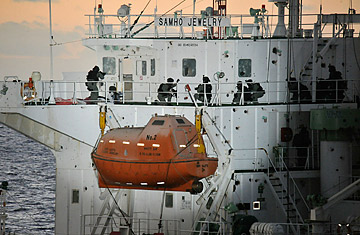
Members of the South Korean naval forces rescue the crew of the cargo ship Samho Jewelry
Last week was not the first time a South Korean cargo ship had been captured by Somali pirates, but it was the first time Seoul decided to take military action to do something about it.
Before the Samho Jewelry was hijacked in the waters off the Somalia coast on Jan. 15, eight other Korean vessels had been taken by pirates off the coast of Africa since 2006, including another of Samho Shipping Company's freighters, the Samho Dream. When the Samho Dream, carrying oil from Iraq to the U.S., was captured last April, the South Korean government decided not to negotiate directly with the pirates, leaving the shipping company to pay a record $9 million ransom to free the 24 hostages.
On Friday, Seoul took a different tactic with the Samho Jewelry, deploying the South Korean navy, with some background help from the U.S. and an Oman patrol ship, in a daring mission to free the freighter's 21 crew members. It was South Korea's first-ever military operation in international waters; in the end, the navy killed eight Somali pirates, captured five and freed all the hostages on board.
Yoo Ho Yeol, a professor at Korea University in Seoul, says that the reaction from the South Korean public to the anti-pirate operation has been overwhelmingly positive. "Our military succeeded in rescuing our people," Yoo says. "This was a good occasion to show off the military's capability and willingness."
Yoo says that last year's Samho Dream debacle — along with the more recent lax response to North Korea's latest provocations, which included deadly attacks on a South Korean warship and island — had created a perception in South Korea that the government seemed unprepared, or unwilling, to react aggressively when faced with threats. That last week's action was calculated to help counter these sentiments was reinforced by President Lee Myung Bak in a televised statement on Jan. 21: "We will not tolerate any behavior that threatens the lives and safety of our people in the future."
The South Korean media has also won presidential approval in the affair after universally abiding by a Ministry of National Defense news embargo on the attacks until Jan. 21. Information had leaked to the press early last week that the mission had begun and that three South Korean navy Seals had been injured in a firefight with the pirates on Jan. 18. Jang Gwang Il, head of defense policy at the Defense Ministry, met with reporters last Monday to ask them to wait to report the story. "The safety of our sailors should come first," Jang told reporters. "We could run into problems saving the sailors if military operation plans are leaked to Somali pirates through media reports."
Just hours after the South Korean mission to save the Samho Jewelry on Friday, the Malaysian navy conducted its own mission to take back a chemical tanker shortly after it was captured by Somali pirates in the Gulf of Aden. In a strikingly similar fashion, all 23 crew members of the MT Bunga Laurel were freed and seven pirates were detained.
The latest moves by South Korea and Malaysia are part of an international effort to combat Somali pirates, who have reportedly made millions of dollars hijacking ships in the past few years. They are currently holding at least 25 ships with more than 600 hostages, according to the E.U.
